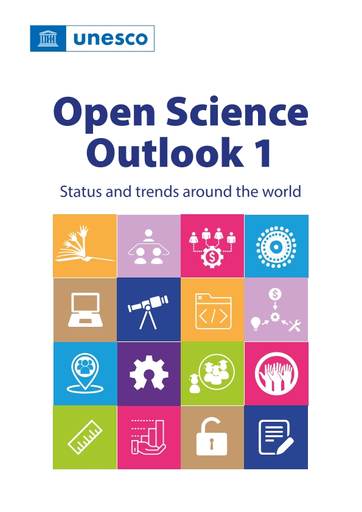This report by the United Nations Educational, Scientific and Cultural Organization (UNESCO) about open science at the global level reports a growing but uneven adoption of open science practices across regions and disciplines. Persistent gaps in socio-economic, technological, and digital aspects hinder progress, with disparities in access to funding, skills, and tools impeding the realization of open science’s full potential. The report emphasizes the necessity for a cultural shift and collaborative partnerships to advance a globally equitable open science.
This report stresses that a primary hurdle hindering the progress of open science lies in aligning the criteria and priorities employed to evaluate scholars and institutions, whether for funding or career advancement. To support the alignment of values in research assessment, UNESCO discusses various global initiatives, such as DORA, whose missions are to establish more responsible and equitable research assessment in the scientific community.
The report highlights the importance of DORA and similar organizations like CoARA, emphasizing that “it is imperative to have globally harmonized scientific assessment grounded in the same system of values for all scholars” in order to advance open science on the global scale. Specifically, UNESCO commends DORA’s aims to encourage robust approaches in research assessment across disciplines, mentioning The Tools to Advance Research Assessment (TARA) project. TARA supports DORA’s objectives by identifying criteria used in academic career assessments, facilitating reform in hiring, promotion, and tenure decisions.
In this report, UNESCO describes the necessity for synchronized values in the evaluation of scholars and institutions as arguably the most imperative goal to achieve in the pursuit of global open science. Promoting open science and instituting standards in the entire scientific community is no easy feat. UNESCO, DORA, CoARA, and a multitude of other organizations recognize the importance of this, and are mutually concerned with the progression of science in an equitable manner, starting with responsible research assessment.
Access the entirety of this report here.
Another informative resource developed by UNESCO is their Open Science Toolkit, which contains “a set of guides, policy briefs, factsheets and online indexes to support the implementation of open science.” View the toolkit here.
UNESCO (2023). Open science outlook 1: status and trends around the world.
https://unesdoc.unesco.org/ark:/48223/pf0000387324

